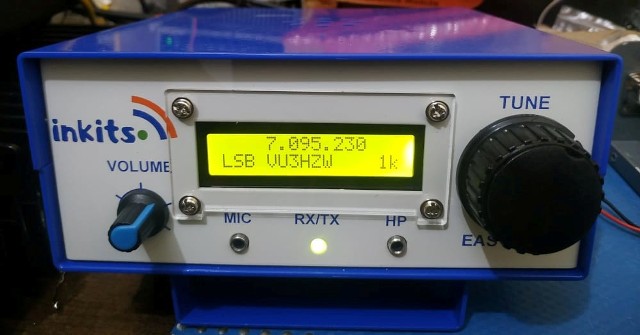The Printed Circuit Boards are furnished with a 2SC2570A RF Amplifier Transistor for Q1.
The pads on the board are for that RF transistor and are C-E-B left to right and the board is correct for that device.
Using it, the board is correct. If you desire to use a standard C-B-E transistor configuration, go to C-B-E mod for an explanation of the board changes.
The amplifiers can be tested individually by connecting +12 volts to the end of the appropriate 100 ohm resistor. Do Not power up both of them at the same time!
We have 100 millivolts in and 920 mv's out. db=20log E1/E2 so db=20xlog 9.2 so we have a measured gain of 19.27db.
Lets measure from the antenna input to the same output spot. This will send signal through the band pass filter. Simply move the signal generator over to the Rx Antenna point, double check the signal generator output and measure again.
100 mv's in and 720 mv's out. db=20log7.2 so we now have a gain of 17.15db. The difference between our earlier gain of 19.27db to our current 17.15db is due to the loss of the band pass filter. Filter loss is -2.12db.
Here we are sweeping from 10 mhz on the left to 20 mhz on the right. Each horizontal division is 1 mhz. It looks like we go from about 13.8 mhz to 14.7 mhz. We might be able to tweak it a little narrower but I can live with this.
Testing the other outgoing amplifier is the same as this one was. The values are the same so the gain should also be similar. All we have to do is to move to the other set of points and shift the +12 volt line to turn it on. We connect to the lower left input point and lets take the output from the "to PA" point. That way we are going through the Q13 amp, the band pass filter, and Q14. We are testing almost 1/4th of the output string.
With 100mv's in, we have 3 volts of output. This is open-circuited and will be lower later but this is a good measurement of how the circuit is working.
db=20log e1/e2
or 20log 3/.1
or 20log30=29.54db
The actual gain of the 2 circuits will be about 2.1 db higher or 31.64db because of the -2.1 db loss of the band pass filter.



.jpg)
